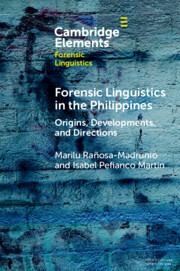Refine search
Actions for selected content:
1 results

Forensic Linguistics in the Philippines
- Origins, Developments, and Directions
-
- Published online:
- 03 March 2023
- Print publication:
- 23 March 2023
-
- Element
- Export citation
